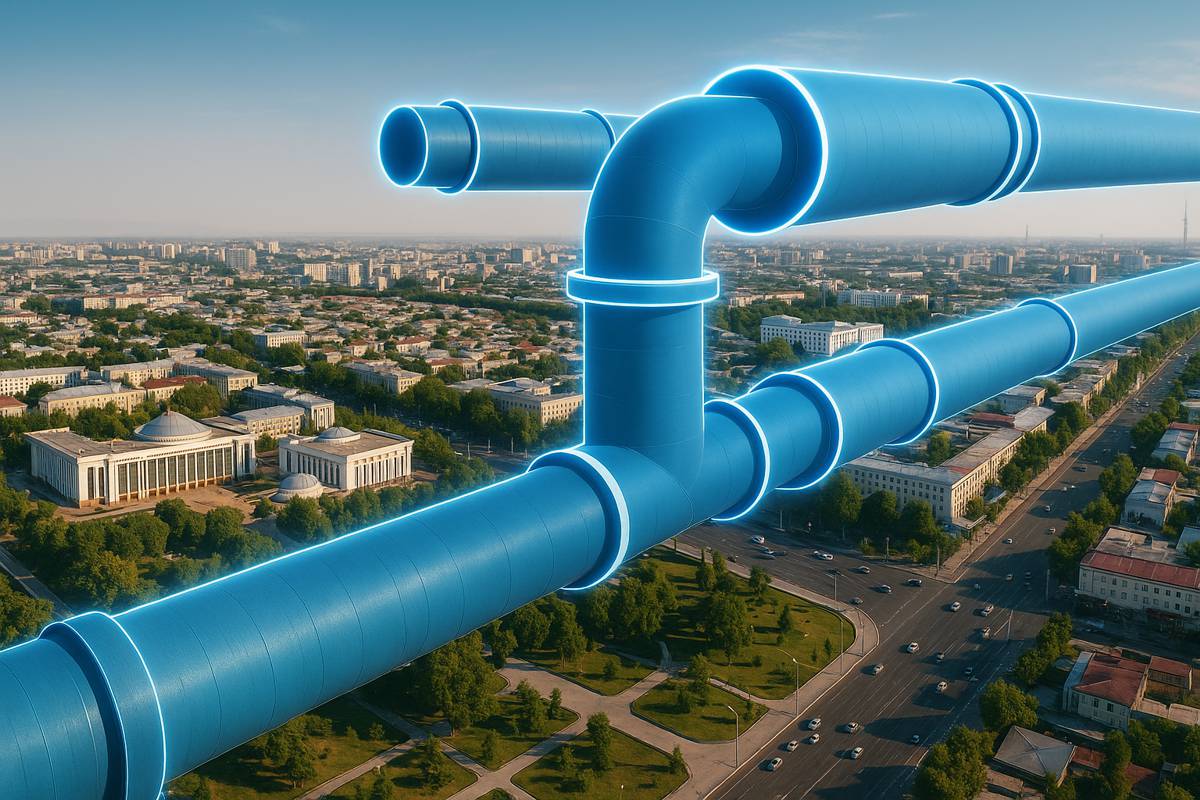Modernising Uzbekistan’s Pipe Infrastructure with Strategic EBRD Investment
Uzbekistan’s long-term infrastructure plans have gained renewed momentum with targeted investments aimed at improving the reliability and resilience of essential networks. Central to these efforts is the expansion of Tashkent Pipe Plant, the country’s leading private manufacturer of prefabricated steel products. The European Bank for Reconstruction and Development has approved a US$ 20 million loan to support the company’s next phase of modernisation, enabling a major upgrade of its insulated large-diameter pipe production.
TPP plays a critical role in delivering essential components for water supply systems, industrial projects and transport infrastructure. The plant is currently the only producer of insulated large-diameter pipes in the country, giving it a unique position in Uzbekistan’s evolving industrial landscape. These high-performance pipes are widely used across water transport systems, mining operations, and commercial and residential developments. They also support large-scale public works, including bridges, roads and overpasses.
The EBRD’s financing will bolster the plant’s working capital and allow TPP to acquire additional raw materials needed for insulation. The investment will also support improvements in the plant’s coating equipment, ensuring the company can increase production volumes and adopt more advanced insulation technology.
Extending the Life of Critical Infrastructure
A major benefit of the project is the enhanced service life of TPP’s insulated pipes. With new insulation systems, the lifespan of these products will increase from the current 15 to 20 years to an estimated 50 years. This improvement offers significant long-term gains for Uzbekistan, aligning with national priorities for greener infrastructure and improved water efficiency.
By reducing the rate of water loss through ageing pipelines, the project will contribute to better access to safe drinking water. This is increasingly important as Uzbekistan works to strengthen water security amid population growth, climate pressures and expanding industrial demand. More durable pipes also mean fewer maintenance interventions, reduced operational costs and more reliable services for communities and businesses.
The EBRD emphasises the value of such investments in long-term sustainability. As stated by the bank’s representatives: “By improving the durability of water pipelines and reducing water losses, the project will help improve the country’s access to drinking water and contribute to a more sustainable infrastructure.”
Supporting Private Sector Growth
TPP’s expansion reflects a broader national strategy to strengthen private industrial capacity. The EBRD has invested €5.57 billion in Uzbekistan across 193 projects, with a strong emphasis on bolstering local entrepreneurship. These investments help diversify the economy, create jobs and encourage the development of competitive domestic industries.
The pipe manufacturer’s ability to scale up production of insulated pipes will reinforce its position in the domestic market and open new opportunities for export. More advanced production capability positions TPP as a regional supplier of high-performance steel products, particularly as neighbouring countries invest in large-scale water, energy and transport projects.
Industry analysts point out that improved insulation technology has transformative potential for Central Asian infrastructure. Beyond water transport, advanced pipe systems support heating networks, district energy schemes and modernised industrial operations. With Uzbekistan rapidly modernising its urban centres, demand for high-quality steel products is expected to rise steadily over the next decade.
Enabling Greener Infrastructure
Environmental sustainability sits at the heart of this project. Long-lasting insulated pipes contribute to lower water losses, reduced energy demand and fewer carbon-intensive maintenance cycles. The project supports Uzbekistan’s broader environmental goals, which focus on improving water management, reducing leakage in distribution systems and enhancing climate resilience.
International research shows that insulated pipelines significantly reduce thermal losses in heating networks and water systems, helping regions cut operational energy consumption. This aligns with global best practice in sustainable infrastructure delivery, where durable materials play a major role in reducing lifecycle emissions.
For Uzbekistan, where water scarcity remains one of the most pressing national challenges, the adoption of long-life pipeline technology is particularly valuable. Extending service life to 50 years places these systems closer to international standards found in European and East Asian markets.
Expanding Industrial Capacity
The additional equipment upgrades financed through the EBRD loan will allow TPP to enhance production efficiency and increase its capacity to meet domestic demand. With more reliable access to raw materials and improved coating systems, the company will be able to establish a more robust supply chain for insulated pipe production.
Technical upgrades to coating equipment also support consistent product quality. Advanced insulation systems must be applied with precision to ensure long-term durability. Modern coating lines rely on automated control systems to reduce heat loss, improve uniformity and achieve reliable adhesion between layers. These improvements strengthen the plant’s competitiveness and ensure its products meet international performance expectations.
Long-Term Value for Uzbekistan’s Growth
Investments in water infrastructure deliver benefits across multiple sectors. Stronger water transport systems support industrial growth, secure residential supply and reduce environmental pressures on rivers and aquifers. As Uzbekistan continues to expand its manufacturing base, reliable access to water remains essential for construction materials, mining operations and agricultural production.
Infrastructure upgrades such as this also reinforce the stability of public services. Reduced downtime, fewer disruptions and improved network performance all contribute to economic resilience. Communities benefit from a more dependable supply of clean water, while construction and industrial firms gain confidence in the availability of essential utilities.
Investment for Long-term Resilience
The modernisation of Tashkent Pipe Plant represents an important advance in Uzbekistan’s efforts to build greener, more reliable and more efficient infrastructure systems. Supported by strategic EBRD financing, the project strengthens domestic industrial capability while delivering clear benefits for water security and economic development.
As the country invests in long-term resilience, improved pipe technology will help ensure that essential infrastructure remains dependable for generations. This project stands as a strong example of how targeted investment can enhance national capabilities, support private sector growth and create lasting value across multiple sectors.




















